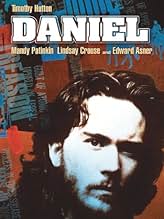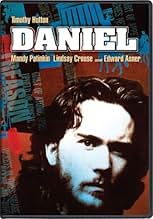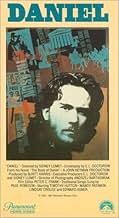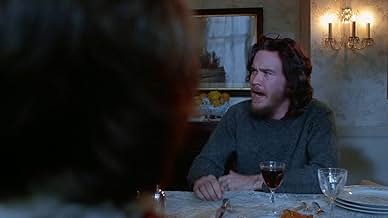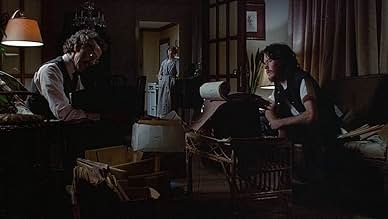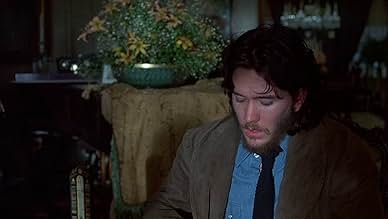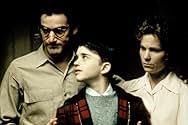CALIFICACIÓN DE IMDb
6.6/10
1.7 k
TU CALIFICACIÓN
Agrega una trama en tu idiomaDaniel Isaacson attempts to determine the true complicity of his parents Paul and Rochelle Isaacson, who were executed for espionage in the 1950s.Daniel Isaacson attempts to determine the true complicity of his parents Paul and Rochelle Isaacson, who were executed for espionage in the 1950s.Daniel Isaacson attempts to determine the true complicity of his parents Paul and Rochelle Isaacson, who were executed for espionage in the 1950s.
Ilan Mitchell-Smith
- Young Daniel
- (as Ilan M. Mitchell-Smith)
Opiniones destacadas
In 1951, Julius and Ethel Rosenberg were tried and convicted of conspiring to deliver atomic secrets to Russia during the 40s (when the U.S. and Russia were wartime allies). The trial took place in an atmosphere of anti-Communist hysteria.
Prior to their arrest, the following events took place: State Department official Alger Hiss was convicted of perjury, Senator Joseph McCarthy launched a campaign to rid the State Department of "subversives", British physicist Klaus Fuchs was convicted of spying for the Russians, Russia exploded an atomic bomb, and the Korean War broke out.
The chief prosecution witnesses were chemist Harry Gold who admitted he had never seen or known either Rosenberg, and Ethel's brother David Greenglass, a machinist working on the Manhattan project in Los Alamos, who provided the jury with details of the Rosenberg's involvement in espionage. Ethel's guilt was based solely on Greenglass' testimony that she had typed up classified secrets (this account was later acknowledged by Greenglass to be false).
In 1953, Julius and Ethel were executed after numerous appeals for clemency had been rejected. The executions caused deep divisions among the American people and the Rosenbergs were the last Americans to be executed for sabotage. Fifty years later, we are still trying to come to terms with the case.
Daniel, a 1983 film based on the novel "The Book of Daniel" by E.L. Doctorow, is a fictional account of the trial and execution of Julius and Ethel Rosenberg (called Paul and Rochelle Isaacson in the movie) focusing on how these events affected their children. Turning in a strong performance, Timothy Hutton plays their son Daniel, who is searching for the truth about his parent's guilt or innocence. Amanda Plummer is his sister Susan (in reality, the Rosenbergs had two sons Robert and Michael) who suffers a mental breakdown as a result of the execution, and Ed Asner portrays the Isaacson's lawyer who did his best for the parents, who are shown as self-righteous and uncooperative.
The movie unfolds in numerous flashbacks delineated by color filters (blue for current, orange for past). Lumet shows the Isaacsons (Mandy Patinkin and Lindsay Crouse) participation in protest movements and Communist Party activities and depicts their arrest, confinement, trial, and execution. The film does not make any statement as to their guilt or innocence. However, in an emotional scene with their accuser's sister, Daniel speculates that Rochelle's brother Selig Mindish (Joseph Leon) fingered the Isaacsons to protect other Party members.
Most of the film centers on the parent's relationship with the children. While showing how much the parents loved them, it also makes clear that their dedication to political causes transcended everything else in their lives (they could have been freed if they named names but their politics dictated that they would not cooperate with the FBI).
Daniel successfully captures the hysteria of the period and the suffering of the children who were shunted between overburdened relatives, children's shelters, and foster parents. In one of the most moving scenes in the film, Daniel and Susan run away from the shelter to walk the streets of New York looking for their old home, while in the background Paul Robeson sings, "This Little Light of Mine".
Though Daniel is a powerful and moving drama, the film is flawed by Patinkin's over-the-top performance, fake Jewish accents, and confusing jumps between different time periods. I also thought Susan's character was created solely to manipulate the emotions. Is Daniel is a great film? No, I don't think it is, but I do love it for its passion and for the courage it shows in bringing to life a difficult and troubling episode in American history.
Prior to their arrest, the following events took place: State Department official Alger Hiss was convicted of perjury, Senator Joseph McCarthy launched a campaign to rid the State Department of "subversives", British physicist Klaus Fuchs was convicted of spying for the Russians, Russia exploded an atomic bomb, and the Korean War broke out.
The chief prosecution witnesses were chemist Harry Gold who admitted he had never seen or known either Rosenberg, and Ethel's brother David Greenglass, a machinist working on the Manhattan project in Los Alamos, who provided the jury with details of the Rosenberg's involvement in espionage. Ethel's guilt was based solely on Greenglass' testimony that she had typed up classified secrets (this account was later acknowledged by Greenglass to be false).
In 1953, Julius and Ethel were executed after numerous appeals for clemency had been rejected. The executions caused deep divisions among the American people and the Rosenbergs were the last Americans to be executed for sabotage. Fifty years later, we are still trying to come to terms with the case.
Daniel, a 1983 film based on the novel "The Book of Daniel" by E.L. Doctorow, is a fictional account of the trial and execution of Julius and Ethel Rosenberg (called Paul and Rochelle Isaacson in the movie) focusing on how these events affected their children. Turning in a strong performance, Timothy Hutton plays their son Daniel, who is searching for the truth about his parent's guilt or innocence. Amanda Plummer is his sister Susan (in reality, the Rosenbergs had two sons Robert and Michael) who suffers a mental breakdown as a result of the execution, and Ed Asner portrays the Isaacson's lawyer who did his best for the parents, who are shown as self-righteous and uncooperative.
The movie unfolds in numerous flashbacks delineated by color filters (blue for current, orange for past). Lumet shows the Isaacsons (Mandy Patinkin and Lindsay Crouse) participation in protest movements and Communist Party activities and depicts their arrest, confinement, trial, and execution. The film does not make any statement as to their guilt or innocence. However, in an emotional scene with their accuser's sister, Daniel speculates that Rochelle's brother Selig Mindish (Joseph Leon) fingered the Isaacsons to protect other Party members.
Most of the film centers on the parent's relationship with the children. While showing how much the parents loved them, it also makes clear that their dedication to political causes transcended everything else in their lives (they could have been freed if they named names but their politics dictated that they would not cooperate with the FBI).
Daniel successfully captures the hysteria of the period and the suffering of the children who were shunted between overburdened relatives, children's shelters, and foster parents. In one of the most moving scenes in the film, Daniel and Susan run away from the shelter to walk the streets of New York looking for their old home, while in the background Paul Robeson sings, "This Little Light of Mine".
Though Daniel is a powerful and moving drama, the film is flawed by Patinkin's over-the-top performance, fake Jewish accents, and confusing jumps between different time periods. I also thought Susan's character was created solely to manipulate the emotions. Is Daniel is a great film? No, I don't think it is, but I do love it for its passion and for the courage it shows in bringing to life a difficult and troubling episode in American history.
In filming E.L. Doctorow's fictionalized account of the Rosenberg case and its implications for the children of Julius and Ethel Rosenberg, Sidney Lumet brought a good vision to the finished product. Lumet grew up in those times and had I'm sure peripheral associations with the kind of people that would have gone the same way as Julius and Ethel or in the case of the film and novel, Paul and Rochelle Isaacson. Lumet's love of New York also helps a lot in this film.
The fictionalized Rosenbergs are played by Mandy Patinkin and Lindsay Crouse. We get the idealism of the Rosenbergs, the history of persecution they felt, the empathy for other minorities. It should never be forgotten that it was Communists for their own reasons, but still were the first ones to take up black civil rights as a group cause. Radical politics and all, Patinkin and Crouse give their children a fine set of universal values to live by.
The real Rosenberg sons were adopted by another couple and to this day still try and claim a good legacy for their parents. In the film the title role of Daniel is played by Timothy Hutton and his sister is played by Ellen Barkin. Years after the executions of their parents they have continued the radical traditions of the parents, but they're into the protest politics of the sixties, involved in a mass movement the parents only dreamed about, but hardly under the auspices of the Communist Party USA.
Barkin is caught up in the moment, but Hutton wants to clear his parent's names. In real life it was Ethel Rosenberg's brother David Greenglass who fingered both of them as Communist spies. Greenglass was assigned as a sergeant to Los Alamos and purportedly did the actual stealing of the atomic bomb design. In other words for the kids it was a beloved uncle.
They should have kept that part of the story, but I'm willing to bet that E.L. Doctorow did not want to be sued by David Greenglass who is still alive now, so a family friend and hanger-on with the Communists played by Joseph Leon is the informer.
The highlight of the film is the confrontation scene with Hutton and Tovah Feldshuh playing the daughter of Joseph Leon. The growing up experiences of both are laid out naked and bare, the acting is some of the best both these players have ever done.
In real life Julius Rosenberg was guilty of being a ringleader of a nest of Communist spies. Ethel Rosenberg's guilt is far more problematic, the closest you could come to here is Mrs. Mary Surratt who ran the boardinghouse where Booth and his fellow conspirators met in the Lincoln assassination plot. Her son was part of the ring, but he fled the country so the country in the ill tempered mood it was in, countenanced the hanging of the mother instead. Ethel was probably supportive of her husband's activities as a dutiful wife and nothing more.
What is also clear is that the US government threw out the rulebook when it came to due process in the prosecution of the case. It was the times, you had to have been there.
Although it's not the real story, no more than Billy Bathgate was about Dutch Schultz, E.L. Doctorow and Sidney Lumet weave a very fine tale about some troubled times.
The fictionalized Rosenbergs are played by Mandy Patinkin and Lindsay Crouse. We get the idealism of the Rosenbergs, the history of persecution they felt, the empathy for other minorities. It should never be forgotten that it was Communists for their own reasons, but still were the first ones to take up black civil rights as a group cause. Radical politics and all, Patinkin and Crouse give their children a fine set of universal values to live by.
The real Rosenberg sons were adopted by another couple and to this day still try and claim a good legacy for their parents. In the film the title role of Daniel is played by Timothy Hutton and his sister is played by Ellen Barkin. Years after the executions of their parents they have continued the radical traditions of the parents, but they're into the protest politics of the sixties, involved in a mass movement the parents only dreamed about, but hardly under the auspices of the Communist Party USA.
Barkin is caught up in the moment, but Hutton wants to clear his parent's names. In real life it was Ethel Rosenberg's brother David Greenglass who fingered both of them as Communist spies. Greenglass was assigned as a sergeant to Los Alamos and purportedly did the actual stealing of the atomic bomb design. In other words for the kids it was a beloved uncle.
They should have kept that part of the story, but I'm willing to bet that E.L. Doctorow did not want to be sued by David Greenglass who is still alive now, so a family friend and hanger-on with the Communists played by Joseph Leon is the informer.
The highlight of the film is the confrontation scene with Hutton and Tovah Feldshuh playing the daughter of Joseph Leon. The growing up experiences of both are laid out naked and bare, the acting is some of the best both these players have ever done.
In real life Julius Rosenberg was guilty of being a ringleader of a nest of Communist spies. Ethel Rosenberg's guilt is far more problematic, the closest you could come to here is Mrs. Mary Surratt who ran the boardinghouse where Booth and his fellow conspirators met in the Lincoln assassination plot. Her son was part of the ring, but he fled the country so the country in the ill tempered mood it was in, countenanced the hanging of the mother instead. Ethel was probably supportive of her husband's activities as a dutiful wife and nothing more.
What is also clear is that the US government threw out the rulebook when it came to due process in the prosecution of the case. It was the times, you had to have been there.
Although it's not the real story, no more than Billy Bathgate was about Dutch Schultz, E.L. Doctorow and Sidney Lumet weave a very fine tale about some troubled times.
DANIEL
"Some day I shall understand"
Some words abouts the complex story. Paul and Rochelle Isaacson (Mandy Patinkin, Lindsay Crouse) were executed in the early 1950s for alleged espionage. Their children Daniel and Susan can't get over this. In the late 1960s, after an attempted suicide of his politically active sister Susan (Amanda Plummer), the rather unpolitical Daniel (Timothy Hutton) tries to find out what exactly happened in the past, tries to understand his parents' lives, tries to help his sister and to get along with his own life...
Sidney Lumet's film "Daniel" (1983) and E.L. Doctorow's novel "The Book of Daniel", which it is based upon, are inspired by the controversial Rosenberg case.
The film shows how children can be affected by the lives of their parents. And it is about the search of one's place in life. Lumet treated these themes again later in his fascinating "Running on Empty" (1988), starring River Phoenix, Christine Lahti and Judd Hirsch. Another theme of "Daniel" is the wish of human beings to understand their parents. Lumet described the movie in a Village Voice interview in the following way: "To me, "Daniel" is the story of a boy who buries himself with his parents, and spends the rest of his life trying to climb out of the grave." The film uses a complex flashback structure to tell its story. "Daniel" illuminates from Daniel Isaacson's view the history of the American left from the 1930s to the late 1960s, including the different left movements. In its criticism of death penalty and McCarthyism, "Daniel" is also a political statement.
Sidney Lumet is one of the great directors of the American cinema. Lumet himself is politically left-leaning, and "Daniel" is probably one of his most personal works. It was about seven years before he got the chance to realize this project. Many people worked on the film for the minimum salary set by the union. Timothy Hutton turned down a million-dollar offer on a film and played Daniel instead for about 25000 dollars.
And Lumet is right when he writes in his informative book "Making Movies": "Despite its critical and financial failure, I think it's one of the best pictures I've ever done." The film proves again Lumet's ability to tell complex, emotionally absorbing, unsentimental stories. Everything works in this uncompromising picture. A few of Lumet's films were marred by their scripts ("The Appointment", "Power", "Family Business", "A Stranger Among Us"). But Doctorow's screenplay for "Daniel" is excellent and extraordinarily multi-layered. Lumet's direction is sensitive and fascinating. Timothy Hutton (who later starred with Nick Nolte and Armand Assante in "Q & A"), Edward Asner (who plays the Isaacson's attorney), Lindsay Crouse (who also appeared in "Prince of the City" and "The Verdict"), Mandy Patinkin, Amanda Plummer and Ilan M. Mitchell-Smith (in the role of the young Daniel in the early 1950s) stand out in a fine cast. The impressive cinematography, which supports the flashback structure by a careful use of color filters, is by Andrzej Bartkowiak, who has worked on 11 Lumet pictures up to now. The rich soundtrack, mainly consisting of songs interpreted by Paul Robeson, perfectly fits and illustrates the film's themes. The editing is excellent as well (a good example is the brilliantly filmed end sequence).
There are many great moments in this film. For instance, there is a powerful rally scene in which you can feel that the Isaacson's children are afraid of the world around them. Another moving scene is a sequence in which young Daniel and young Susan (played by Ilan M. Mitchell-Smith and Jena Greco) walk through New York in search of their home. This scene, also showing Lumet's typically great use of the city of New York, reminded me of Michelangelo Antonioni.
I'm an admirer of Sidney Lumet's cinema. "Daniel" is one of his most underestimated motion pictures, really a must-see. Of course, don't expect standard Hollywood entertainment, but a serious work.
"Some day I shall understand"
Some words abouts the complex story. Paul and Rochelle Isaacson (Mandy Patinkin, Lindsay Crouse) were executed in the early 1950s for alleged espionage. Their children Daniel and Susan can't get over this. In the late 1960s, after an attempted suicide of his politically active sister Susan (Amanda Plummer), the rather unpolitical Daniel (Timothy Hutton) tries to find out what exactly happened in the past, tries to understand his parents' lives, tries to help his sister and to get along with his own life...
Sidney Lumet's film "Daniel" (1983) and E.L. Doctorow's novel "The Book of Daniel", which it is based upon, are inspired by the controversial Rosenberg case.
The film shows how children can be affected by the lives of their parents. And it is about the search of one's place in life. Lumet treated these themes again later in his fascinating "Running on Empty" (1988), starring River Phoenix, Christine Lahti and Judd Hirsch. Another theme of "Daniel" is the wish of human beings to understand their parents. Lumet described the movie in a Village Voice interview in the following way: "To me, "Daniel" is the story of a boy who buries himself with his parents, and spends the rest of his life trying to climb out of the grave." The film uses a complex flashback structure to tell its story. "Daniel" illuminates from Daniel Isaacson's view the history of the American left from the 1930s to the late 1960s, including the different left movements. In its criticism of death penalty and McCarthyism, "Daniel" is also a political statement.
Sidney Lumet is one of the great directors of the American cinema. Lumet himself is politically left-leaning, and "Daniel" is probably one of his most personal works. It was about seven years before he got the chance to realize this project. Many people worked on the film for the minimum salary set by the union. Timothy Hutton turned down a million-dollar offer on a film and played Daniel instead for about 25000 dollars.
And Lumet is right when he writes in his informative book "Making Movies": "Despite its critical and financial failure, I think it's one of the best pictures I've ever done." The film proves again Lumet's ability to tell complex, emotionally absorbing, unsentimental stories. Everything works in this uncompromising picture. A few of Lumet's films were marred by their scripts ("The Appointment", "Power", "Family Business", "A Stranger Among Us"). But Doctorow's screenplay for "Daniel" is excellent and extraordinarily multi-layered. Lumet's direction is sensitive and fascinating. Timothy Hutton (who later starred with Nick Nolte and Armand Assante in "Q & A"), Edward Asner (who plays the Isaacson's attorney), Lindsay Crouse (who also appeared in "Prince of the City" and "The Verdict"), Mandy Patinkin, Amanda Plummer and Ilan M. Mitchell-Smith (in the role of the young Daniel in the early 1950s) stand out in a fine cast. The impressive cinematography, which supports the flashback structure by a careful use of color filters, is by Andrzej Bartkowiak, who has worked on 11 Lumet pictures up to now. The rich soundtrack, mainly consisting of songs interpreted by Paul Robeson, perfectly fits and illustrates the film's themes. The editing is excellent as well (a good example is the brilliantly filmed end sequence).
There are many great moments in this film. For instance, there is a powerful rally scene in which you can feel that the Isaacson's children are afraid of the world around them. Another moving scene is a sequence in which young Daniel and young Susan (played by Ilan M. Mitchell-Smith and Jena Greco) walk through New York in search of their home. This scene, also showing Lumet's typically great use of the city of New York, reminded me of Michelangelo Antonioni.
I'm an admirer of Sidney Lumet's cinema. "Daniel" is one of his most underestimated motion pictures, really a must-see. Of course, don't expect standard Hollywood entertainment, but a serious work.
Daniel (Timothy Hutton) is the son of two radical parents. I don't mean radical like it was used in the 80's, but radical as it was used in the 60's and earlier. They were heavily active in the Communist Party as it was represented in America. Their involvement and even their lives came to an end when they were accused of selling atomic secrets to the Russians.
You can imagine the effects on a child when his/her parents are executed. And in this case Daniel had a sister, so two children were negatively affected. The movie bounces back and forth between the late 30's/early 40's and the 60's which was pre and post Daniel's parents' death. Susan (Amanda Plummer), Daniel's sister, has taken her parents' death a lot harder than Daniel. She's convinced that the government executed them unjustly whereas Daniel needs more proof.
"Daniel" is politically charged with the politics of 1940's America. The acting performances were good even if the script was a bit lacking. I like Sidney Lumet as a director which is why I even watched. It's a dense topic, but nothing Lumet can't handle. I think the movie's biggest failure was to move me. There was a little bit of mystery and a lot of drama, but none of that truly drew me in.
You can imagine the effects on a child when his/her parents are executed. And in this case Daniel had a sister, so two children were negatively affected. The movie bounces back and forth between the late 30's/early 40's and the 60's which was pre and post Daniel's parents' death. Susan (Amanda Plummer), Daniel's sister, has taken her parents' death a lot harder than Daniel. She's convinced that the government executed them unjustly whereas Daniel needs more proof.
"Daniel" is politically charged with the politics of 1940's America. The acting performances were good even if the script was a bit lacking. I like Sidney Lumet as a director which is why I even watched. It's a dense topic, but nothing Lumet can't handle. I think the movie's biggest failure was to move me. There was a little bit of mystery and a lot of drama, but none of that truly drew me in.
7sol-
After his worried sister suffers a nervous breakdown, a graduate student tries to investigate whether his parents were really guilty of being Soviet spies in this solemn drama from Sidney Lumet. The film is loosely based on an actual married couple who were executed in the 1950s with their young children forced to grow up without them. The film shares some striking similarities with Lumet's latter 'Running on Empty' as it spins a tale of two youths trying to live their own lives separate from their parents' political actions. Not nearly as well-known or acclaimed, 'Daniel' is beset by an unhelpful, overly complex narrative structure that jumps randomly between time periods. Some of the supporting performances are also overwrought. The film does well though depicting Daniel and his sister's difficulties as children removed from their parents. The harsh times they experience in a state run institution are especially potent and the bond between the pair is heartfelt. Timothy Hutton is also perfectly cast in a passionate performance as the adult title character and his on/off narration of how the electric chair works is effectively eerie. Speaking of which, the eventual execution scenes are handled very well. On one hand, 'Daniel' is a bit of a mess with its time period leaps and inconsistent performances, but its portrait of a young man haunted by his parents' fate truly resonates.
¿Sabías que…?
- TriviaReportedly, actor Timothy Hutton wanted his part so much he had his agent constantly telephone director Sidney Lumet to organize an interview. Later, Hutton flew to New York at his own cost, met with Lumet, and within twenty minutes had secured the role.
- Citas
Paul Isaacson: If they didn't arrest people, they'd have nothing to do.
- Versiones alternativasNBC edited 33 minutes from this film for its 1987 network television premiere.
- ConexionesFeatured in By Sidney Lumet (2015)
Selecciones populares
Inicia sesión para calificar y agrega a la lista de videos para obtener recomendaciones personalizadas
- How long is Daniel?Con tecnología de Alexa
Detalles
Taquilla
- Total en EE. UU. y Canadá
- USD 687,475
- Total a nivel mundial
- USD 687,475
Contribuir a esta página
Sugiere una edición o agrega el contenido que falta


